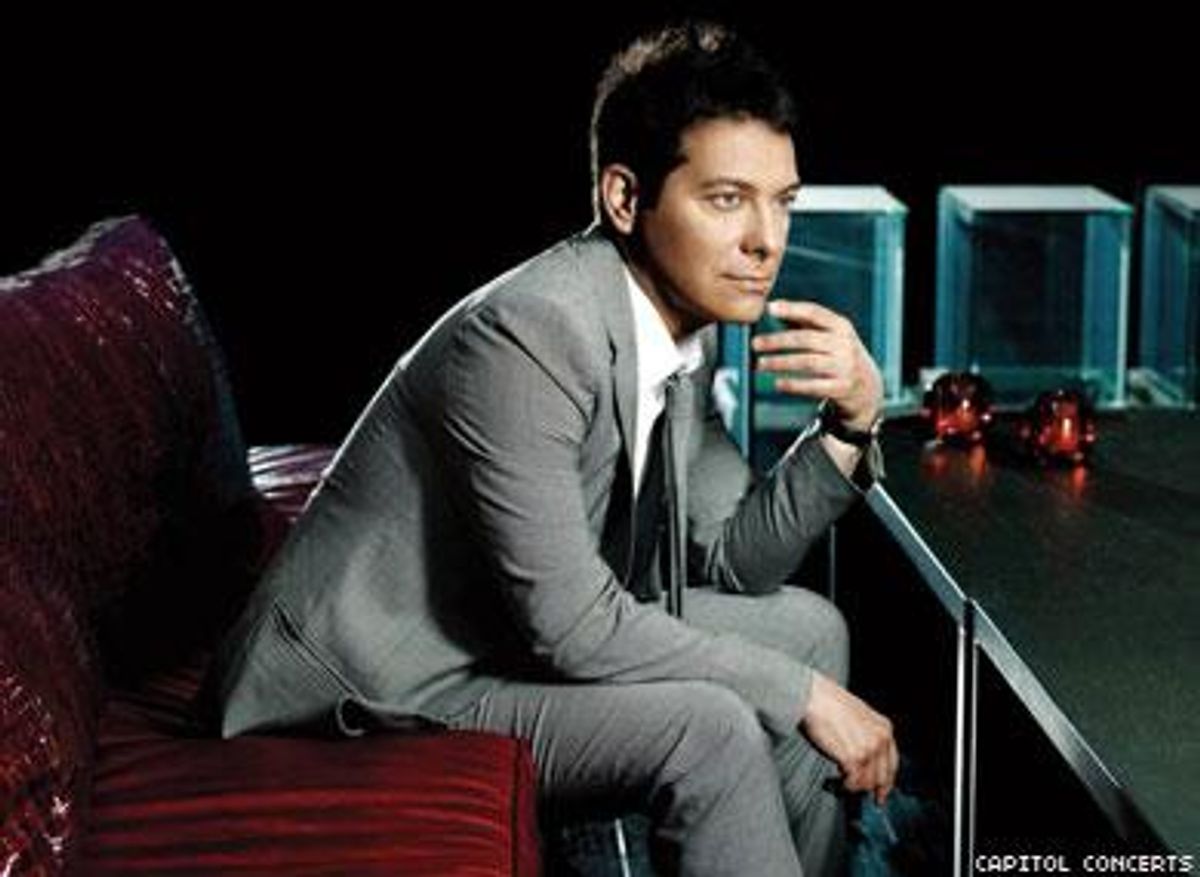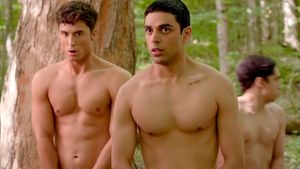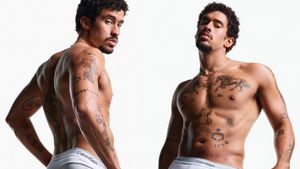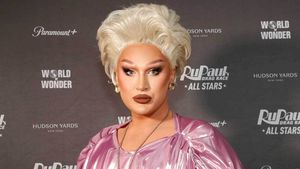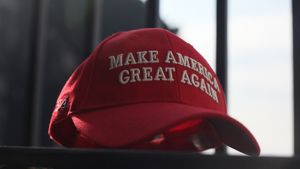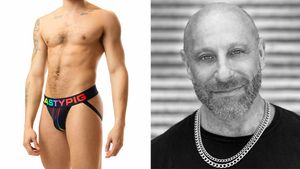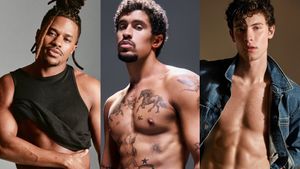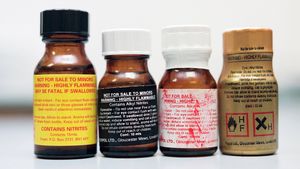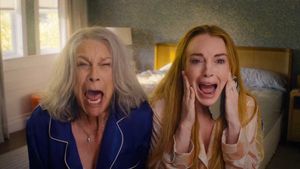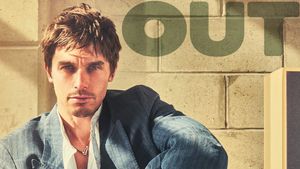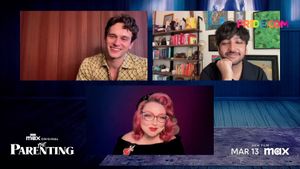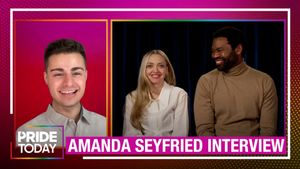The public feud between five-time Grammy-nominated crooner Michael Feinstein and Tony-winning entertainer Dame Edna Everage (a.k.a. Australian comedian Barry Humphries) may just be a publicity stunt to promote their new show, but Feinstein's longtime beef with The Advocate is anything but bogus. All About Me, which opens March 18 at Henry Miller's Theatre, marks the first time the 53-year-old former Ira Gershwin protege has held court on Broadway since 1990. This interview marks the first time he's agreed to speak to The Advocate since his 1994 cover story, which -- spoiler alert! -- he hated. Calling a truce on the silent treatment, Feinstein speaks candidly about the perks of being cordial to White House conservatives and kissing in the shadows with Cheyenne Jackson.
Advocate.com: I understand you haven't spoken to The Advocate since your 1994 cover story.
Michael Feinstein: Oh, I was so angry about that, so I said I would never speak to The Advocate again.
Why were you angry?
They made it into a big "coming out" thing.
But didn't you say in the interview that it was the first time you'd spoken to a magazine about your sexuality?
Yes, but they turned it into something it wasn't. When they first approached me, I said, "I'm not in the closet, so I can't come out. I'm happy to do an interview, but I'm not coming out from anything." They said, "We understand." And then they put "The Piano Man Comes Out" on the cover, which was not only dishonest but clearly just for publicity and to sell magazines. I was so offended by that.
Are you still upset?
Well, I haven't read The Advocate since. But that was a long time ago.
I assure you that there's a totally different editorial staff now. And if it makes you feel any better, I was still in high school in 1994.
[Laughs] Yeah, I know.
Just to illustrate how much people can change over time, in 1994 you were single and said you never wanted a wedding because you disliked marriage ceremonies. Cut to 2008, when you married Terrence Flannery, your partner of 11 years, in a star-studded ceremony officiated by Judge Judy Sheindlin.
Well, you try to say no to Judge Judy.
You were quoted in the Advocate article as saying, "Publicly I'd like to say that I should have the right not to discuss my personal life." You also said, "I don't believe in stating something that doesn't need to be stated because I live my life the way I want to." Considering the political progress made since 1994 -- and particularly as a man who got married in California during that brief window of time before Prop. 8 -- do you now feel it's more important for gay celebrities to be vocal about their sexuality?
I think it's important for everyone to be true to themselves. It's great when people have the confidence to discuss their sexuality if it works for them. I can't fault someone for not coming out because I don't know their journey, what scares them, what's at stake, or how it will affect their personal life or family. There might be mitigating circumstances or psychological issues that are, in their mind, too hard to overcome. I do, however, take great exception to people like Kevin Spacey, who has very vocally expressed to be heterosexual. I find that very offensive.
Though you spoke openly in the interview about having "sexual relationships with men," you adamantly stopped short of saying "I am gay," even when pushed to do so by the interviewer. Looking back, why it was so difficult to say those words?
I just didn't like the word "gay." I still don't like it. It's a dumb way of describing sexuality. I like "queer" or other words, but "gay" is a word that had a completely different meaning word and has been reappropriated. I just don't like it.
What kind of response did you get from fans after the article came out?
I don't really remember, except that one gig in Florida with a Jewish organization was canceled, and I think that was because of The Advocate. And I remember my parents weren't thrilled that I discussed my private life so openly. But I don't read anything that's written about me, and my friends already knew all my secrets, so it didn't really impact my life all that much. On one hand it felt good talking about that part of myself, but on the other hand I felt a little uncomfortable because it wasn't something I was used to doing. Now I'm more accustomed to it because of getting married to Terrence and those sorts of things, but it wasn't as easy to talk about back then.
Because there were even fewer out celebrities in 1994 than there are today, did you feel pressure from the gay community to become an activist?
I've always found that the most powerful way to create change is to be myself and not be afraid to express who I am. Activism is a very admirable way to create change, but it has to go hand in hand with personal contact with the people with whom we have opposing points of view; without that, there will never be any movement. Several years ago I was invited to play at the White House on Valentine's Day during George W. Bush's administration. I was immediately going to say no. But Terrence said, "Michael, you've been in the White House many times, but I haven't, and I'd like to go. What's the big deal?" I said, "The big deal is that I want to be treated equally." He said, "OK, let's just make sure that happens." So I responded to them and said, "Yes, I will entertain for Valentine's Day, but only if my partner and I are treated as a couple in every way." They said they would, and they did. The celebration was primarily the Bushes' personal friends, donors, and supporters, so it was mainly conservatives and Republicans. So there we were, having cordial conversations with these people, clearly introduced and perceived as a couple. That's very powerful and necessary because someone can see that and say, "Gee, that's not so dangerous and scary." When people who oppose your lifestyle meet you as human beings, that opinion can change. And yet I remember somebody contacted me after that and said that someone had written a letter to The Advocate saying that my playing for the White House was like a Jew playing for Hitler. I did respond to that because it was so shocking to me and it showed such ignorance.
I have no idea how to segue from that story, but let's move on and discuss All About Me. Even with Next Fall and La Cage aux Folles on the boards, it may just be the gayest show on Broadway this season.
Yes, who would've thought? Well, I would've. It definitely has a niche appeal to discriminating young men and women.
Have you and Dame Edna determined which of you has the bigger gay following?
We don't need to have that discussion because it's a given that they're both very big.
Out playwright Christopher Durang, who cowrote All About Me's book, recently spoke to The Advocate and described you as "kind of the Alice in Wonderland seminormal person" of the show. Do you see it that way?
Well, I don't know what normal is, but I'll take it as a compliment.
Your earnestness does make an amusing foil for Edna's over-the-top sarcasm and irreverence. "Chocolate and peanut butter" definitely doesn't describe it, so what do you two go together like?
In the show we sing a song with the lyric "We may be like oil and water, Alec Baldwin and his daughter, but we get along amazingly well." That about says it.
There's a moment in the show where you talk about growing up "different" and finding a friend in show tunes, movie musicals, and the Great American Songbook -- something the gay audience can certainly relate to.
I just knew that I had a sensibility that was different from most of the people around me. Part of it was sexuality, which became more apparent as I got older, even though I remember being attracted to men as early as 5 years old. Why there's a heightened appreciation of irony, camp, and art is something I can't answer except to say that there's definitely a sensibility that has greatly enriched our world. If you were to remove anything that had a homosexual influence, you'd have a very barren world. If only these people who are so vocally against homosexuality realized the extraordinary scope of what the homosexual influence has created.
Like Paul Lynde, to whom you pay tribute in the show before singing "A Lot of Livin' to Do" from Bye Bye Birdie.
I've always liked that song, and I always think of Paul Lynde when I think of Bye Bye Birdie because that's when I first discovered him. I later met him in California. He was always drunk and mean, but that didn't change his sense of humor, which was wonderful.
You've been known to change the gender pronouns of traditionally female-sung songs, perhaps most notably on your 1987 Gershwin album when you changed "The Man I Love" to "The Girl I Love." In All About Me you sing "As Long as He Needs Me" from Oliver as "As Long as She Needs Me." I mean, if you can't leave the lyrics alone in a Dame Edna show, where can you?
Casey Nicholaw, our director, said, "Do whatever you want," so I was singing it as "As Long as He Needs Me." But several people said they wanted to hear me do it as "she" because they felt that "he" would distract some people in the audience. I said, "Who cares?" But some nights I sing it as "he" and some nights I sing it as "she."
I can understand your not bothering to alter the female pronouns in a traditionally male-sung song, but are the male gender pronouns a constant issue for you every time you sing or record a standard originally intended for a female?
No. I don't have the issues about it that other people do. To me, love is not about pronouns or gender. When I sing a love song, whether I sing "he" or "she" doesn't change the emotion of it. Anybody who listens to a love song, whether male or female, adapts it in their own mind to what they want it to be. Sometimes I'll change it, but sometimes I'll sing a song a certain way because having known the songwriters I know they would prefer me to sing it that way. I tend to still sing "she" because I know that's the way Ira liked it, but I've sung "Someone to Watch Over Me" as "he" and as "she." If I feel like it's an audience who wants to hear the same-sex reference, I'll put it in because more people will appreciate it. There's no hiding of anything in my life at this point. It kind of doesn't matter to me.
It was refreshing to hear you sing the lyric "my taste in men" instead of "my taste in friends" in the song "Old Friend" on the recording of The Power of Two, the show you did with Cheyenne Jackson last summer at your posh Manhattan nightclub, Feinstein's at Loews Regency.
I recorded it once as "my taste in friends" back in the '80s, and when I met [the songwriters] Gretchen Cryer and Nancy Ford, they actually told me that they preferred for me to say it that way. But because of the way Power of Two was coming together, I felt it worked better and would be more powerful as "my taste in men." It felt good to sing it that way.
Yours and Cheyenne's taste for men really seemed to inform that show. It made your duet of "We Kiss in a Shadow" from The King and I especially poignant.
That song was written about two people not being able to love because of their differences. I'd once been told by an older gentleman that Johnny Mathis's recording of that song had become an underground anthem for him and other like-minded men when he was younger. That stuck with me, so I suggested to Cheyenne that we do it as a duet. Cheyenne said, "I don't know if I want to do that song. Rodgers and Hammerstein all sounds alike to me." [Laughs] I said, "Would you trust me on this?" Once we started to rehearse it, he immediately got it, of course. When we did that number in the show you could hear the palpable excitement of the audience. It turned out to be a high point of the show and very fulfilling to perform.
You also included "The Time Has Come," a coming-out anthem written by Marshall Barer and Mickey Leonard after the Stonewall riots.
Marshall was a good friend of mine who died in 1998. He had a whole bunch of cassettes made up with just that song on them, and at one point he sent a bunch of them over to me with a note that said, "Dear Michael. Would you please distribute these wherever you find gatherings of a large number of cocksuckers? Love, Marshall." I've always had great affection for that song, and introducing the song in that context gave it an added resonance.
So who's the bigger diva -- Dame Edna or Cheyenne Jackson?
No one's a bigger diva than Dame Edna. She's clinically a narcissist. Cheyenne could justifiably be a great diva, but he wins everything naturally with his charm and handsomeness. He's the most fun, agreeable, and easygoing person to be around.
Well, thanks for being easygoing enough to bury the hatchet and do this interview. By the way, I'm mailing the latest copy of The Advocate to your dressing room. Sean Hayes speaks openly about his sexuality for the first time, but we refrain from using the words "comes out" on the cover. You'll love it.
[Laughs] All right. I'm happy to return to the fold.
